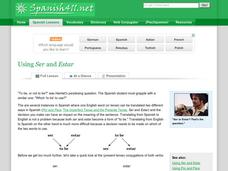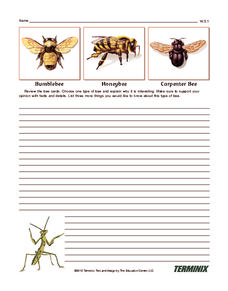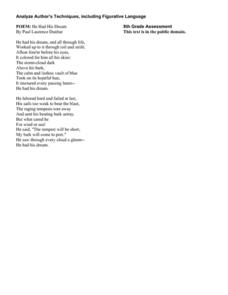Curated OER
Spanish Sentence Structure
Instruct your class on how to put together a sentence in Spanish. The resource covers the different parts of speech, showing how the Spanish version of each sentence compares with the English version. While there are no procedures...
Curated OER
Using Ser and Estar
While ser and estar both mean to be, they are each used in different situations. This is often confusing for Spanish language learners. Clarify these verbs for your class with direct instruction. The information included on...
Terminix
Bee Writing Prompt
What do your pupils know about bees? Ask them to examine facts and images about three different types of bees and write about one type. Pupils explain why their chosen bee is interesting and back up their ideas with facts and opinions....
Curated OER
Manga and Me
Upper elementary and middle school learners study Manga cartooning and create a Japanese character based on their own features and personalities. This style of cartooning is easily-accessible for most students. With a little practice,...
Curated OER
Mini Coil Pots: Ceramics Lesson
Art is a wonderful way to teach historical or cultural concepts. Here, learners view a series of coil pots that have been created throughout history by a variety of civilizations. They then create and decorate a pot of their own that...
Curated OER
Analyze Author’s Techniques, Including Figurative Language
Paul Laurence Dunbar's poem "He Had His Dream" is the focus of a quick exercise. Pupils read the poem and answer four multiple choice questions and one short answer question about specific lines in the poem and the author's purpose....
Curated OER
Modals: Can, May and Will Verbs: Present Tense
Cover can, may, will, and shall with this instructional activity on using modals in the present tense. Starting off with a warm-up activity, the resource includes a text to analyze, examples of modals, and exercises with answers. The...
Curated OER
Poetry Cubes
Students develop an appreciation for different styles of poetry and learn different techniques for memorization.
Curated OER
Food Chain
Third graders role-play various organisms from a food chain to illustrate how a food chain works. In relay style, 3rd graders fill their cups (stomachs) and, in turn, fill a larger organism's cup (stomach) to visualize the importance of...
Curated OER
Three Arts in Retrograde
Students make connections between music, the other arts, and other curricular areas. They compare characteristics of two or more arts within a particular historical period or style and cite examples from various cultures.
Curated OER
Mathematics & Nutrition
Students apply math to calculate fat and calories in the food they eat. They examine food package information to become aware of the ingredients and to learn about healthy life styles. They work in groups to create crazy meals using the...
Curated OER
Getting the Story
Students examine and discuss the basic elements of a newspaper article. They listen to articles, discuss the 'inverted pyramid' style of a breaking news article, and list imaginary current events based on mythological characters.
Curated OER
Hula How?
Third graders start writing papers with much more regularity than they did in the previous grades. They are starting to differentiate between the styles of writing and know why each is important. This activity gives the them a chance to...
Curated OER
Kuba African Cloth
Students identify four different African cloth design styles and associate them with the cultures examined in this lesson. The lesson also includes a creative project where each student creates their own cloth design.
Curated OER
Baroque Composer Presentations
Students create an understanding of contemporary artistic styles and genres through an overview of the connection of the arts throughout modern history. Students discussed visual, written and aural artistic mediums, as well as their...
Curated OER
Radio Program #7: The Impact of Early Radio
Students examine and interpret the experiences of persons who lived in the early days of radio. identify the technology, program content, and social aspects of early radio listeners. They interview parents for their experiences. Students...
Other popular searches
- Learning Styles
- Leadership Styles
- Conflict Resolution Styles
- Architectural Styles
- Classical Music Styles
- Art Styles
- Personal Management Styles
- Communication Styles
- Architecture Styles
- Musical Styles
- Learning Styles Inventory
- Film Styles















